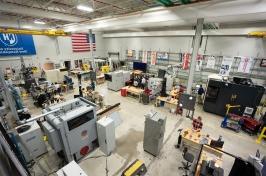
Associate professor of anthropology Meghan Howey founded UNH’s campus archaeology program, which gives students interested in anthropology and archaeology a chance to get some hands on experience in the fields.
She says the program is a natural complement to UNH’s leadership in the area of sustainability.
“An important part of sustainability is cultural sustainability,” Howey says. “When we think about protecting our resources, we need to take our cultural heritage on UNH property seriously.”
Howey worked with Jillian Price ’13 to uncover some of that heritage during Price’s senior year at UNH, when she excavated the location of the former World War I barracks to find out more about what campus was like during that war.
“Essentially, we used the material record that we found in the ground and compared it with archival record,” Howey says. They discovered a dichotomy — the perceived community and the actual “lived” community.
The archival record, newspapers and journals and such, was rich with notions of nationalism at the time and portrayed “a sort of imagined community of good soldiers,” Howey says. But what they unearthed indicated all rules were not obeyed — the lived community had booze, even though New Hampshire was dry at the time.
“The students had real lives that weren’t just part of the Army,” Howey says.
The results of the investigation will be published in an upcoming edition of the International Journal of Historical Archaeology with Price as the lead author.
A Train Ran Through It

Find out what archaeology students have been discovering while digging at the site of the former rail station.
Follow Meghan Howey @Dig_UNH or find her in the classroom; Howey will teach The Lost Campus: The Archaeology of UNH during the fall semester.
-
Written By:
Tracey Bentley | Communications and Public Affairs






















































